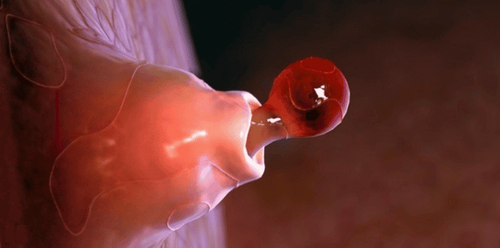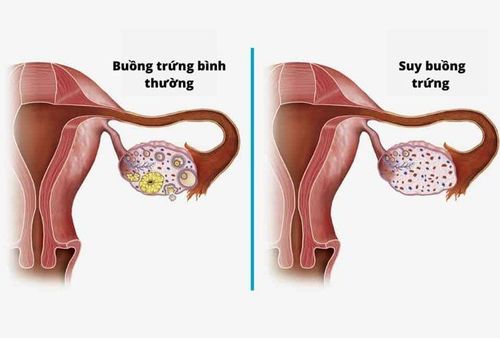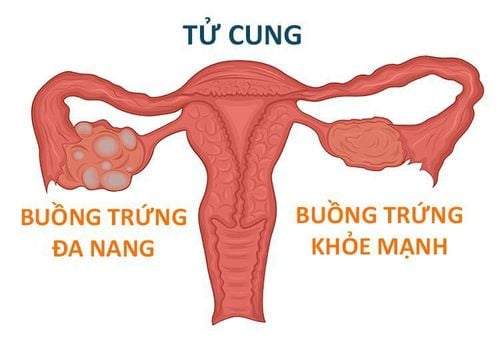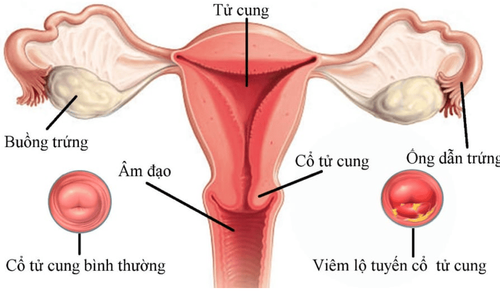This is an automatically translated article.
Ovulation disorders are one of the leading causes of female infertility. Ovulation disorders are caused by disturbances in the balance of hormones that regulate the menstrual cycle or can also be caused by lifestyle and medication use. So what is infertility caused by ovulatory disorders?1. Overview of Ovulation Disorders
Ovulation disorders are a range of conditions that affect a woman's endocrine system, which controls a woman's hormones and ovulation pattern, the process by which a woman's ovaries release eggs in the menstrual cycle.
Ovulation disorders can cause irregular, irregular, and non-ovulatory ovulation and this is a common cause of irregular menstrual cycles.
Certain medications, conditions and lifestyle factors can affect hormone levels and cause ovulation disorders. According to the World Health Organization, dysfunctional ovulation is the cause of infertility in couples in about 25% of cases.
2. Ovulation disorders and infertility
Ovulation disorders are a common cause of infertility in women. During a normal menstrual cycle, the endocrine system prepares the body for pregnancy by secreting hormones, most notably gonadotropin-releasing hormone (GnRH), follicle-stimulating hormone (FSH), and luteinizing hormone (LH).GnRH and FSH are the hormones responsible for the maturation of eggs in a woman's ovaries. LH promotes the final release of a mature egg (ovum) into the fallopian tube, where it can be fertilized by a man's sperm.
Although cycle lengths vary, women who ovulate regularly tend to have 28-day menstrual cycles and ovulate once in that 28-day period. Women with a hormone imbalance or hormone deficiency may experience irregular or no ovulation (ovulation) and infertility as a result.

Rối loạn phóng noãn là nguyên nhân gây vô sinh phổ biến ở phụ nữ
3. Common Ovulation Disorders and Symptoms
The endocrine system plays an important role in the menstrual cycle and pregnancy. Certain medications, conditions, and lifestyle factors, such as being overweight or underweight, affect hormone levels and can cause irregular hormone production or damage the ovaries leading to ovulation disorders.
The two most common ovulatory symptoms are irregular or absent menstrual periods and difficulty getting pregnant.
3.1 Polycystic Ovarian Syndrome (PCOS) Scientists don't know the exact cause of PCOS but it could be due to a hormone imbalance that affects a woman's androgen (testosterone) levels female and insulin receptivity. Low levels of insulin reception can lead to increased blood sugar and increased testosterone.
Although women produce some testosterone in a natural way, women with high testosterone levels associated with PCOS may experience irregular or no periods. The creation of multiple cysts over time can prevent the ovarian follicles from producing mature eggs, and an excess of the androgen testosterone can disrupt ovulation and cause infertility. Other symptoms of PCOS include excessive hair on the face, chest, abdomen, and upper thighs, weight gain, acne, and severe oily skin.
3.2 Hypothalamic amenorrhea FSH and LH are essential for pregnancy. During the menstrual cycle, the pituitary gland secretes FSH to signal to the ovaries that an egg is needed to mature into an ovum. FSH levels begin to decrease as LH levels begin to rise, signaling the release of a newly mature egg from the follicle. Women with hypothalamic amenorrhea may experience irregular or absent ovulation because their bodies don't have enough nutrients or fat levels needed to send hormone impulses to the ovaries.
Excessive stress, high or low body weight and weight gain or loss can all be contributing factors. Hypothalamic amenorrhea is common in professional athletes, dancers, and women with anorexia nervosa.
3.3. Premature ovarian failure and menopause Premature ovarian failure (POF), also known as primary ovarian failure (POI), is the onset of menopause before the age of 40. During early and chronic ovarian failure During menstruation, the ovaries stop producing estrogen. Premature ovarian failure usually occurs because the body has "emptied out" of the functioning ovarian follicles (the sac that turns into an egg) prematurely or the ovarian follicles are not functioning properly.
Women's bodies produce less estrogen as they age, but the cause of premature ovarian failure is still unknown. Women who have autoimmune disorders, have received chemotherapy or radiation, or who have certain genetic disorders are more likely to develop ovarian failure earlier.

Suy buồng trứng sớm có thể gây rối loạn phóng noãn ở phụ nữ
3.4. Hormonal Imbalances An excess of certain hormones can lead to female infertility. For example, an excess of prolactin, a hormone produced by the pituitary gland, can cause hyperprolactinemia. During hyperprolactinemia, an excess of prolactin reduces estrogen levels, causing infertility.
3.5. Lifestyle factors that can affect ovulation Several lifestyle factors such as a woman's activity level, weight, and medication use can affect hormone levels and cause infertility. Women who are overweight or obese may also have hormone imbalances that affect their ability to conceive.
3.6. Medications Medicines such as nonsteroidal anti-inflammatory drugs (NSAIDs) such as ibuprofen can interfere with ovulation when taken for a long time. Steroids, even those prescribed by doctors for medical use, interfere with the hormones needed for ovulation as well as some medications for epilepsy. Many birth control methods use hormones to interfere with the ovaries' ability to produce and release eggs.
Although medications can alter ovulation, it's important to discuss drug withdrawal with your prescribing physician before eliminating them.
4. Diagnosis and treatment of ovulatory disorders
Some ovulatory disorders can be diagnosed with physical examination, medical history, and menstrual history. But other disorders need laboratory blood tests for a positive diagnosis. Depending on the symptoms that women appear, doctors will conduct different hormone levels test. For example, if a woman has symptoms of PCOS, the doctor will likely test the woman's testosterone and insulin levels to make a decision.
Once diagnosed, most ovulatory disorders can be treated with lifestyle changes or medications. Your doctor may recommend nutritional adjustments, fertility drugs to replenish missing hormones, or stress relief. Women with irregular or no periods should see a fertility specialist if they are unable to get pregnant within 12 months of having unprotected sex on a regular basis (six months if women over 35 years old).
It is best in cases where women are identified with ovulation disorders should go to specialized medical facilities for treatment as soon as possible to improve the chances of conception.
Currently, IVF Reproductive Center - Vinmec International General Hospital provides examination and treatment for couples who are having problems with reproductive function, including ovulation disorder.
The examination process here is always carried out methodically under the advice and support of domestic and foreign experts and doctors. Along with good medical quality, attentive and dedicated customer service, the hospital is always at the forefront of investing in modern equipment to bring a high success rate for couples. from the very first time.
Please dial HOTLINE for more information or register for an appointment HERE. Download MyVinmec app to make appointments faster and to manage your bookings easily.













